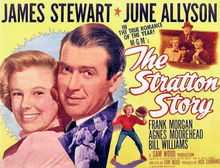The Stratton Story
The Stratton Story is a 1949 American biographical film directed by Sam Wood which tells the true story of Monty Stratton, a Major League Baseball pitcher who pitched for the Chicago White Sox from 1934–1938. This is the first of three movies that paired stars Jimmy Stewart and June Allyson, the others being The Glenn Miller Story and Strategic Air Command. Stratton commented that Mr. Stewart "did a great job of playing me, in a picture which I figure was about as true to life as they could make it".
| The Stratton Story | |
|---|---|
 1949 theatrical poster | |
| Directed by | Sam Wood |
| Produced by | Jack Cummings |
| Written by | Douglas Morrow |
| Screenplay by | Guy Trosper George Wells |
| Starring | James Stewart June Allyson Frank Morgan Agnes Moorehead |
| Music by | Adolph Deutsch |
| Cinematography | Harold Rosson |
| Edited by | Ben Lewis |
Production company | |
| Distributed by | Metro-Goldwyn-Mayer |
Release date |
|
Running time | 106 minutes |
| Country | United States |
| Language | English |
| Budget | $1,771,000[1] |
| Box office | $4,488,000[1] |
The Stratton Story was a financial success and won the Academy Award for best Writing – Motion Picture Story.
Plot
Texas farm boy Monty Stratton (Stewart) demonstrates a knack for pitching a baseball. With the help of washed-up, catcher-turned-scout Barney Wile (Morgan), he manages to get a tryout with the Chicago White Sox during their spring training in California. He shows promise and is given a contract.
On his first evening at spring training, he is introduced to a young woman named Ethel (Allyson). They start dating and fall in love. Stratton must part from Ethel to go to Chicago. When Stratton is sent down to a minor league team, he proposes marriage. Stratton is called back up to the White Sox and returns to Chicago with his newlywed bride. By the end of the season, they're expecting a child. Next season, he is pitching an away game and doesn't seem to be able to keep his mind on the game. He wishes he was with his wife who's giving birth in Chicago. When he is notified that he has a son, he throws a wild pitch and is taken out of the game—grinning from ear to ear.
As his career progresses, Stratton improves so much that he's voted an all-star in the American League. In the off-season of 1938, Stratton accidentally shoots himself in his right leg while hunting on his farm in Texas. When his leg has to be amputated, it looks as though his pitching career is over. He understandably goes through a very dark, brooding period. Nevertheless, with the support of his wife and a wooden leg, Stratton learns to walk along with his baby boy. He works hard and starts practicing his pitching again. He makes an inspirational, successful minor league comeback in 1946.
Cast
- James Stewart as Monty Stratton
- June Allyson as Ethel
- Frank Morgan as Barney Wile
- Agnes Moorehead as Ma Stratton
- Bill Williams as Eddie Dibson
- Bruce Cowling as Ted Lyons
- Cliff Clark as Josh Higgins
- Mary Lawrence as Dot
- Dean White as Luke Appling
- Robert Gist as Earnie
- Gene Bearden as Himself
- Bill Dickey as Himself
- Jimmy Dykes as Himself
- Mervyn "Merv" Shea as Himself
Ronald Reagan had sought the title role but was under contract with Warner Bros., which did not want to release Reagan for the film because they thought the movie would be a failure.[2] Van Johnson was also announced at one stage to play the lead.[3]
Production
Scenes were staged at various baseball parks, including:
Brookside Park in Pasadena, a spring training site for the White Sox.
- Comiskey Park in Chicago, the home field of Stratton's team, the White Sox.
- Gilmore Field, the home of the Hollywood Stars of the Pacific Coast League, used in the final scenes of the film, which were set in Texas.
- Wrigley Field, the Los Angeles version, was used in some scenes.
- Stock footage was used of some other American League baseball parks, in establishing shots.
Moorehead reportedly met her second husband, actor Robert Gist, during the making of this film.
Reception
According to MGM records the film earned $3,831,000 in the US and Canada and $657,000 overseas resulting in a profit of $1,211,000.[1] It was one of the most popular films of the year.[4]
Radio adaptation
The story was also adapted for a CBS Lux Radio Theatre episode in 1949 as "The Stratton Story". Stewart and Allyson repeated their roles for the program.[5]
References
- The Eddie Mannix Ledger, Los Angeles: Margaret Herrick Library, Center for Motion Picture Study.
- "Monty Stratton, 70, Pitcher Who Inspired Movie, Is Dead". The New York TImes. AP. 1982-09-30.
- "The Starry Way". The Courier-Mail. Brisbane: National Library of Australia. 13 March 1948. p. 2. Retrieved 6 July 2012.
- "Top Grossers of 1949". Variety. 4 January 1950. p. 59.
- "The Stratton Story", via Jimmy Stewart on the Air.